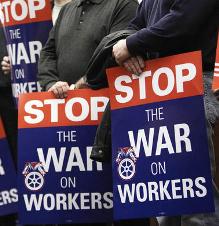Confronting the Anti-Union “Right to Work” Laws. Oregon’s Pending Legislation to Increase the Minimum Wage

In Oregon, Democrats dominate all branches of politics. Yet the labor unions are still terrified. There is justifiable dread that anti-union “Right to Work” laws will be purchased into existence by out-of-state billionaires championing the laws around the country.
This threat recently reared its head in Oregon, when anti-union groups announced that they are planning on launching a voter initiative in 2016 to apply “Right to Work” laws to Oregon’s public sector unions in an effort to decapitate the labor movement.
Fortunately, an antidote to Right to Work is also being publicly debated in Oregon, where there is pending legislation to push the state’s minimum wage to $15. Labor unions, churches and community groups across the state have embraced $15, after having watched the successful $15 campaigns in neighboring Seattle and San Francisco. Where $15 has been won, the labor movement has been exponentially strengthened as a result.
But Oregon’s $15 legislation is in danger. It’s in the hands of Democrats who seem intent on killing the bill. After making campaign promises to raise the minimum wage, the victorious Democrats have backtracked with lightning speed.
Oregon Senate President Peter Courtney recently announced that he “wasn’t going to do the minimum wage” this legislative session, as if the prerogative of one politician should trump the desires of hundreds of thousands of Oregonians.
Oregon labor unions are not backing down. They are mobilizing under the “Fair Shot” coalition with community groups like “15now Oregon” to pack the state capitol on April 13th where the $15 minimum wage bill is being discussed in the legislative hearings.
Groups like “15now Oregon” are demanding that Democrats “Don’t Kill the Bill.” But if the $15 bill does die ingloriously in a legislative committee, $15now plans to resurrect it via a statewide voter initiative. In order to survive the coming fight around Right to Work, Oregon unions need a $15-sized victory, by any means necessary.
Much of the Oregon public still thinks of unions as alien organizations. When you add the anti-union media to the mix, a hospitable environment is created for the cancer of Right to Work, which in actuality serves to lower wages for all workers.
Fighting this corporate cancer can only be done via organizing and action, and mobilizing the broader public in support of inspiring pro-worker demands, such as a $15 minimum wage that benefit all workers. If unions are perceived as solely pursuing their own narrow self-interests at the expense of everyone else, they will not have the support to repel the Right to Work campaign.
Every victory for the labor movement fortifies it against Right to Work attacks, since unions grow stronger in relation to their corporate enemies. The labor movement in Seattle and San Francisco now struts with the confidence associated with flexing its muscles, having won a slew of major progressive victories that began with the $15 minimum wage.
When San Francisco unions announced to the public that they were leading the campaign for a $15 minimum wage– and having later succeeded– non-union people immediately became “pro-union,” and thus against “Right to Work.”
Organizing big victories that excite and mobilize the broader community teach the public the relevancy of unions. Small victories are good too, but big wins reverberate and sink into the public consciousness. Attaching the union name to winning a $15 minimum wage would instantly change the perception of Oregon unions, as it did in Seattle and San Francisco.
Right to Work is not inevitable in Oregon. There is still time to go on the offensive. It is likewise not inevitable that the $15 legislation will die in committee. Nothing is inevitable in politics. A large campaign by the unions can pressure Democrats into passing $15, and if that fails, an exciting union-led campaign can win $15 by championing a statewide voter initiative.
Shamus Cooke is a social service worker, trade unionist, and writer for Workers Action (www.workerscompass.org). He can be reached at [email protected]

